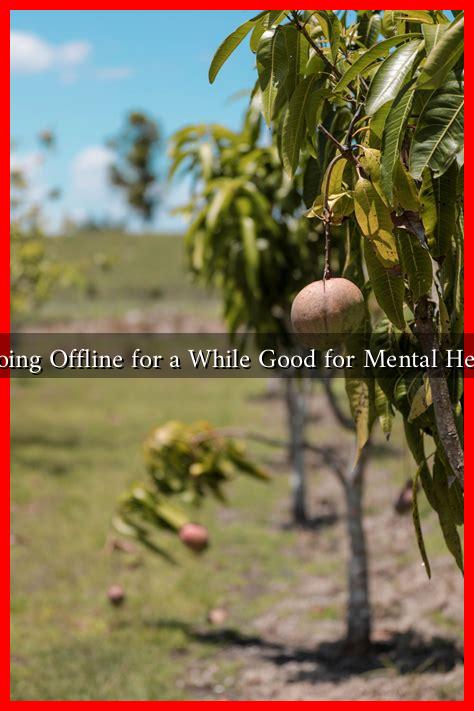-
Table of Contents
- Is Going Offline for a While Good for Mental Health?
- The Digital Dilemma: Understanding the Impact of Constant Connectivity
- Benefits of Going Offline
- Real-Life Examples: Success Stories of Digital Detox
- Statistics Supporting the Need for Digital Breaks
- How to Go Offline: Practical Tips
- Conclusion: The Path to Better Mental Health
Is Going Offline for a While Good for Mental Health?
In an increasingly digital world, the question of whether taking a break from online activities can benefit mental health has gained significant attention. With social media, constant notifications, and the pressure to stay connected, many individuals find themselves overwhelmed. This article explores the mental health benefits of going offline, supported by research, statistics, and real-life examples.
The Digital Dilemma: Understanding the Impact of Constant Connectivity
Our lives are intertwined with technology, and while it offers numerous advantages, it also poses challenges to mental well-being. Studies have shown that excessive screen time can lead to various mental health issues, including anxiety, depression, and stress. According to a report by the American Psychological Association, individuals who spend more than two hours a day on social media are more likely to report poor mental health outcomes.
Benefits of Going Offline
Taking a break from the digital world can yield several mental health benefits:
- Reduced Anxiety: Disconnecting from social media can alleviate the pressure to constantly compare oneself to others, which is a significant source of anxiety for many.
- Improved Focus: Going offline allows individuals to concentrate better on tasks without the distractions of notifications and online interactions.
- Enhanced Relationships: Spending time offline can lead to more meaningful face-to-face interactions, strengthening personal relationships.
- Better Sleep: Reducing screen time, especially before bed, can improve sleep quality, which is crucial for mental health.
Real-Life Examples: Success Stories of Digital Detox
Many individuals have reported positive changes after taking a break from their digital lives. For instance, a study published in the journal Cyberpsychology, Behavior, and Social Networking highlighted a group of college students who participated in a week-long digital detox. The results showed a significant decrease in feelings of loneliness and an increase in overall happiness.
Another example is the popular trend of “digital detox retreats,” where participants engage in activities like yoga, meditation, and nature walks without the interference of technology. These retreats have gained popularity, with many attendees reporting improved mental clarity and emotional well-being.
Statistics Supporting the Need for Digital Breaks
Several statistics underscore the importance of taking breaks from technology:
- A study by the Royal Society for Public Health found that social media platforms like Instagram and Snapchat are linked to increased feelings of anxiety and depression among young people.
- According to a survey by the Pew Research Center, 64% of Americans believe that social media has a mostly negative effect on the way things are going in the country today.
- Research from the University of Pennsylvania found that limiting social media use to 30 minutes a day can lead to significant improvements in well-being.
How to Go Offline: Practical Tips
If you’re considering a digital detox, here are some practical tips to help you get started:
- Set Clear Boundaries: Decide how long you want to disconnect and stick to it.
- Engage in Offline Activities: Fill your time with hobbies, exercise, or reading to keep yourself occupied.
- Inform Your Contacts: Let friends and family know you’ll be offline to manage expectations.
- Gradual Reduction: If going completely offline feels daunting, start by reducing your screen time gradually.
Conclusion: The Path to Better Mental Health
In conclusion, going offline for a while can be a powerful tool for improving mental health. The benefits of reduced anxiety, improved focus, and enhanced relationships are compelling reasons to consider a digital detox. As we navigate the complexities of modern life, taking time away from screens can lead to a more balanced and fulfilling existence. Whether through a weekend retreat or simply setting aside specific hours for offline activities, the positive impact on mental well-being is undeniable. For more insights on mental health and technology, you can visit American Psychological Association.

